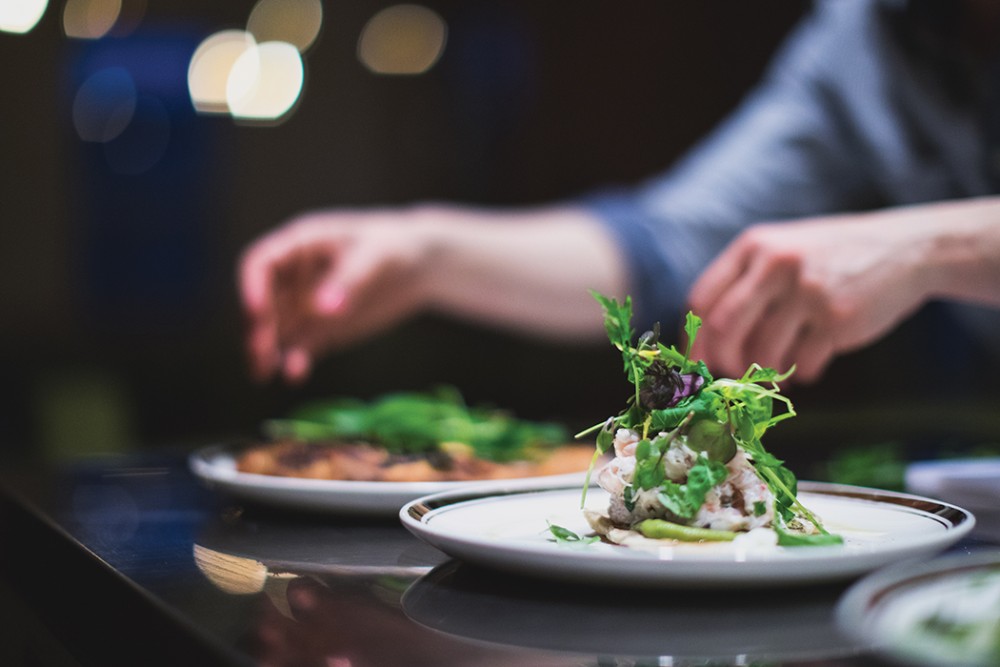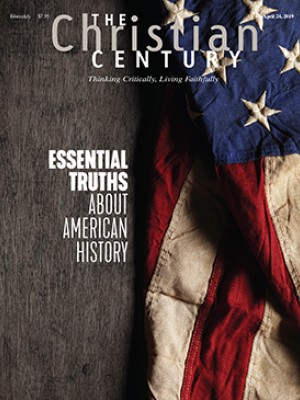The preacher is a chef who prepares a meal
Like good cooking, good preaching is local, idiosyncratic, and diverse.

Last year the culinary world lost two of its brightest lights. Anthony Bourdain took his own life in a French hotel, and Los Angeles Times critic Jonathan Gold died of pancreatic cancer. It is hard to overestimate the loss of these two figures.
Bourdain made his name initially as an unremarkable chef and a great writer. His book Kitchen Confidential exposed the strange kitchen liturgies in a New York restaurant, which in Bourdain’s telling was partly a pirates’ galley, partly a form of high art. He found his true calling as the world’s best guest in kitchens across the world. With his shows No Reservations and Parts Unknown, Bourdain brought attention to diverse cuisines. His great gift was his ability to be as comfortable in the finest kitchens of France as he was in the tents of Bedouin hosts. As he played guest, he played host to the rest of us who longed to travel as he did and gain the access he had.
Read our latest issue or browse back issues.
Above all, he was honest. If it tasted good, he let you know. If it tasted bad, or smacked of inauthentic food opportunism, his wrath was of Amos: I despise your fusion bistro. I cannot stand the stench of your avocado foam and truffle oil. Though you offer me your grass-fed bavette, I will not accept it. Food was an expression of truth, and Bourdain hated lies. Food wasn’t just a bodily necessity; it was a holy offering and sacred gift. Bourdain was able to convince us that every corner of the world was full of food that could nourish body and spirit alike.
If Bourdain belonged to the world, Gold belonged to Los Angeles. The only food critic to win a Pulitzer Prize, Gold told LA’s story through food. Gold could have succeeded in New Orleans, Charleston, New York, Taipei, or any other world-class food city; it just happened that Los Angeles captured his heart.
What set Gold apart was his deep care and concern for the people who cooked his food. He famously roasted critics who never bothered to look up from the plate. “When you look at food without referencing who cooked it and what the ingredients are and how they might’ve been produced, you might as well be describing a stamp collection,” he wrote. When most food critics covered the newest fine dining, Gold found himself in small inauspicious restaurants headed by immigrant chefs with little formal training.
Rereading his reviews, I am stunned by his earnest desire to understand and care for the immigrant experience and the ways it inspired his favorite food. He knew that food literally and figuratively stayed with you as you left the restaurant. Your full belly was accompanied by memory of the food, the company, the mood, and the occasion. Food could not be divorced from the people making it, the culture that inspired it, and the communities it sustained. For Gold, cooking and eating were among the most purely human pursuits, and any discussion about food was also about people, cultures, regions, and soils. All food stories are human stories.
Gold and Bourdain knew that cooking, like storytelling, was a holy pursuit of meaning. Dinner was a convening moment that could sustain a community through its most dire moments. It is also a deeply vulnerable medium. It is dangerous to share the food that tells your people’s story. Gold and Bourdain knew that rejecting a food as too stinky, too salty, too bland, or too funky was to make a judgment on the people who produced the food. The courage to risk rejection and offer food to a stranger (especially a critic like Bourdain or Gold) demands deep respect. Bourdain and Gold exhibited a reverence that honored the gift for the holy and sacred thing that it was.
In the wake of their deaths, I’ve been reflecting on my chosen creative medium of preaching. Though I have been committed to the art of preaching for a couple of decades, I haven’t quite figured out how to quantify or explain its power. I have leaned on the explanations of ancient confessions (“The word of God preached is the Word of God,” says the Second Helvetic Confession) and modern wisdom (preaching is “truth through personality,” says Phillips Brooks), but nothing fully captures the ineffable ways in which preaching encounters the world.
I have lately begun thinking of preaching as preparing a meal. The sign of a good meal is the empty plate. It’s all gone. What’s left is a memory and a feeling. We could try and recreate the meal again, but it will never be exactly the same.
The sermon, too, is a localized experience. It exists in the moment when it is received into our bodies, hearts, and minds. By the time the listener exits the church, it is not exactly gone—it is inside the person—but neither is it present. The plate is empty. The memory holds, and the sermon does its work from within.
Some years back, I moved to Boston, ignorant of the sound of New England preaching. This was especially ironic considering I had been hired to teach preaching to a bunch of New Englanders. I was unprepared for what the city offered on any given Sunday.
In Cambridge, Jonathan Walton at Harvard’s Memorial Church offered his careful erudite force, a contrast to the dynamic fire of Ellis Washington a few blocks away at St. Paul AME Church. The downtown churches around Copley Square traded in haute cuisine: thoughtfully prepared meals of brilliance and exegesis. On any given Sunday, Trinity Church and Old South Church provided some of the most delicious preaching in the city. The care and craft of these sermons was balanced by the chaotic and alive preaching of the common cathedral community that met on Boston Common.
In Boston’s South End, pastors at Lion of Judah preached sermons that inspired piety and action in equal measure. On Dorchester Street, Fourth Presbyterian housed the most avant-garde community in the city: a mix of locals, immigrants, and Harvard Divinity School students combined for a marvelous fusion. In the suburbs, local fare came with a heavy dose of cheer. Inspiring stories and deep theology mixed in a comforting stew. Farther north, where the steeliest New Englanders gathered, the sermon came simple and unadorned. What it lacked in style, it more than made up in nutrition.
Each Sunday, faithful ministers were feeding the city, and I was happy to sample their food. The sermons were remarkable, and I left these churches fed. I can’t remember all the special ingredients of the sermons, but I was nourished. My appetite for God, wisdom, and truth was, for a moment, sated.
In May 2018, Baylor University released its list of the 12 most effective preachers of the English-speaking world. It inspired immediate criticism, especially because the list included only one woman and lacked any international diversity. The announcement also obscured the nature of the survey and respondents who produced it.
When I read Baylor’s list for the first time, I was annoyed at what seemed to be a naked publicity grab—an opportunity for Baylor to promote its own name. After Bourdain and Gold died, I had another thought about the list. I realized that the preaching world lacked a Bourdain or a Gold who valued the art of preaching in all of its localness, its idiosyncrasies, and its wonderful diversity. I began to long for a Gold who could explain to me the special tenor of Chicago preaching, or the intonations of the Gulf Coast preacher. I wanted a Bourdain who could take me into the faraway pulpit so I could vicariously taste the preaching cuisine of a new place.
Preaching and cooking are connected by their common ending. The sign of a great dish is the same at Le Bernardin as it is at your local taqueria: an empty plate. By the end of a ministry, the sermons have all been prepared, served and, hopefully, taken in. Records of dishes may be catalogued in menus, bulletins, and cookbooks and sermon files may remain, but the real record is in the memories of an experience.
Gold and Bourdain knew that their taste was valuable. They used their palates to show people food that they would otherwise never know existed. They honored the power of cooking by lifting up food that was inaccessible to most people a generation ago. They championed restaurants and cuisines that never made the world’s best restaurants lists. They revered the cook who sought the better approach to cooking, marrying taste, memory, technique, and culture, whether in a Michelin three-star restaurant or at a hole-in-the-wall in the local strip mall. They were incessant in their search for those transcendent moments inspired by food. They never once, as far as I can tell, worried about the effectiveness of food.
Figures on the Baylor list like Thomas Long and Barbara Brown Taylor are superlative American preachers, just as Eric Ripert, Daniel Boulud, and Dominique Crenn are superlative French chefs. But these preachers cannot represent the possibilities available whenever a nervous preacher strides into a pulpit, turns on the pulpit light, and begins to cook.
Inspired by Bourdain and Gold, who were committed to providing honest guidance in the culinary world, we can expand our vision of preaching beyond effectiveness and think about it as the faithful pursuit of nourishment. We need to attend to the diversity that already exists.
Musicians listen to music, and athletes watch video replays of games. Preachers should listen to other preachers. Attending to the diversity of preaching allows us to reappreciate the special local flavor of our own preaching. It should encourage us to find ways to learn from others without copying them.
Even as Bourdain and Gold expanded my imagination, and as Boston preaching nurtured my appetite, I remain hungry. I want more, for the sake of my own preaching but also to delight in the deliciousness of the preached word prepared every week.
A version of this article appears in the print edition under the title “The preacher as chef.”





